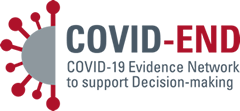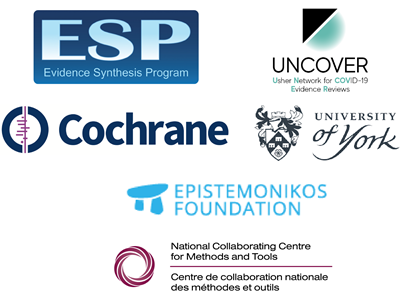Approach to developing the inventory
The COVID-END inventory of best evidence syntheses was developed and is maintained using the following approach:
- one staff member harvests evidence syntheses from the high-yield, high quality sources of evidence syntheses in our guide to COVID-19 evidence sources (which we acknowledge below) and extracts preliminary data (e.g., whether it contains a GRADE evidence profile and is a living evidence synthesis) that we use in prioritizing work flows
- each member in a pair of staff members each independently
- assesses the eligibility of each harvested synthesis (i.e., confirms it addresses a COVID-19 decision, includes a search of two or more bibliographic databases, and includes explicit criteria for selecting included studies)
- applies ‘filters’ to each evidence synthesis for all parts of the COVID-END taxonomy of decisions that are addressed by the synthesis (and resolve any differences by consensus) assesses other key features of each synthesis (e.g., type of synthesis and type of questions addressed)
- each member in a pair of staff members each independently assesses the quality of each evidence synthesis using AMSTAR (and a summary of the quality of syntheses in the database and inventory is available here)
- one staff member draws on the available data (date of last search, quality of synthesis and available GRADE profile) to identify the ‘best’ evidence synthesis (or, if there are several contenders or one contender for two or more facets of the issue, to identify the best two or more evidence syntheses), writes a ‘declarative title’ that provides decision-relevant details like the interventions or exposures examined and the certainty of available evidence, and proposes any change to the taxonomy needed to accommodate the new evidence synthesis
- a senior advisor edits the re-worded declarative title (particularly for those related to clinical management) before it is posted.
Please send suggestions for how to improve the inventory to covid-end@mcmaster.ca.
COVID-END gratefully acknowledges the ‘high-yield, high quality’ sources of evidence syntheses from which we harvest evidence syntheses to be considered for the inventory:
- U.S. Veterans’ Affairs (VA) Evidence Synthesis Program, with which COVID-END exchanges records on a weekly basis (with new evidence syntheses shared by the program and value-added content about relevant records returned by COVID-END)
- Usher Network for COVID-19 Evidence Reviews (UNCOVER), with which COVID-END exchanges records on a weekly basis (with new evidence syntheses shared by the program and value-added content about relevant records returned by COVID-END)
- Cochrane, from which COVID-END harvests Cochrane reviews
- Epistemonikos, from which COVID-END harvests updates to Epistemonikos’ living evidence syntheses on select topics
- PROSPERO, with which (through a grant from the UK’s National Institute of Health Research) COVID-END exchanges records on a weekly basis (with new registered protocols shared by PROSPERO and value-added content about relevant protocols returned by COVID-END)
- National Collaborating Centre for Methods and Tools, with which COVID-END exchanges records on a weekly basis (with new registered evidence syntheses shared by the program and value-added content about relevant records returned by COVID-END)
COVID-END also gratefully acknowledges the three main living evidence syntheses covering the safety and efficacy of all drug types (rather than syntheses covering single molecules) which we rely on to present molecule-specific findings on the evidence about clinical management page.
- McMaster/Magic Evidence Ecosystem Foundation/BMJ (which maintains a living network meta-analysis about drug treatments, prophylaxis and antibodies and cellular therapies for COVID-19) – you can find the latest peer-reviewed publication in the BMJ for drug treatments, prophylaxis and antibody and cellular therapies, as well as its latest update in this website
- COVID-NMA (which is one of the two groups providing frequent updates to meta-analyses at the level of individual molecules)
- Pan American Health Organization (which is the second of two groups providing frequent updates to meta-analyses at the level of individual molecules)
 This work is licensed under a Creative Commons Attribution-NonCommercial 4.0 International License.
This work is licensed under a Creative Commons Attribution-NonCommercial 4.0 International License.
Search our guide to key
COVID-19 evidence sources

